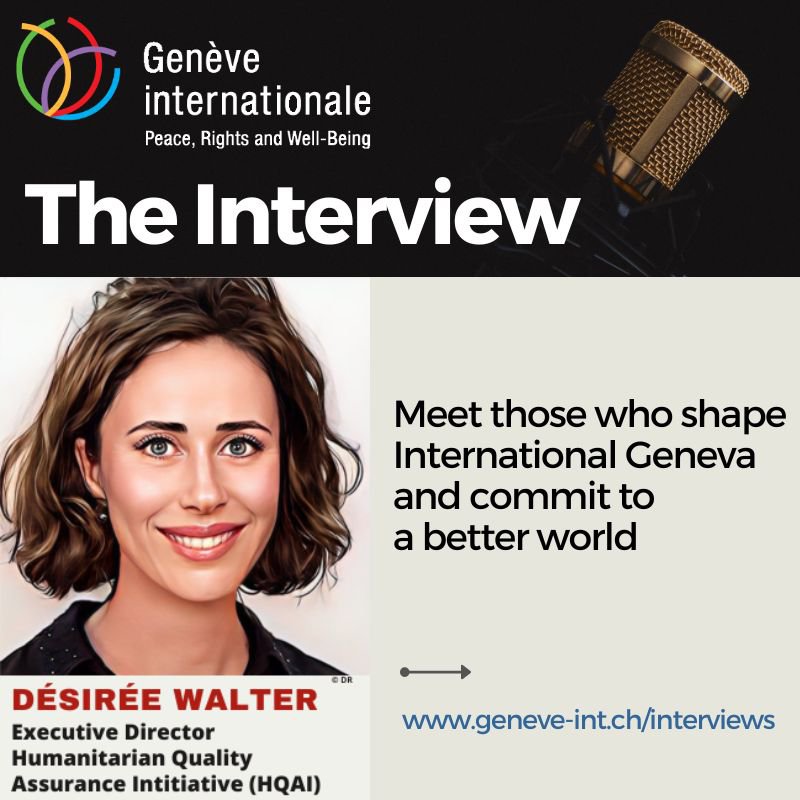Désirée Walter's interview by International Geneva
“We believe it sometimes takes an independent body to quality-assure the work of organisations with vulnerable communities. Our external audits build stakeholder trust, trigger continual learning and organisational capacity building within organisations, and ultimately help improve aid delivery."
September 2023
Earlier this month, our Executive Director, Désirée Walter, was interviewed by International Geneva about our work.
How would you present your organization in a few words? What entails your position? What is your goal?
With a focus on accountability to people affected by crises, HQAI has built a bridge from professional auditing to the humanitarian and development sector. We believe that it sometimes takes an independent body to quality-assure the work of organisations with vulnerable communities. The external audit builds trust with stakeholders and triggers continual learning and organisational capacity building within the organisations. In short, we aim to improve the principled, accountable, and efficient delivery of aid.
Our goal is to embark many more actors along the chain of accountability on this journey: governments, funders, intermediaries, NGOs, networks, individuals ... The sector is changing rapidly and profoundly. Needs are on the raise; funds are dwindling and need to be channelled wisely. And while the important role played by local and national actors is increasingly recognised, “localisation in practice” is slow to pick up speed. HQAI offers technical solutions to some of the relevant challenges the sector is facing, in particular on deduplication of due diligence requirements, more equitable partnerships, participation, and direct funding. My role here is to inform and convince.
Among the concentration of actors in Geneva (IOs, NGOs, permanent missions, academia, and the private sector), who do you work with and how?
International Geneva is a fascinating hub for quality exchange with strategic stakeholders. In an increasingly complex humanitarian landscape, this offers a variety of approaches to listen, inform, and influence. However, the density can also become overwhelming and overstretch the agendas of actors we would like to meet.
HQAI’s audited partners are NGOs that are spread across the world, from Dhaka to New York. Only a few have their head offices in Switzerland, but many are represented in Geneva through networks and other actors (CHS Alliance, ICVA, SCHR for example).
We are also collaborating with some of the permanent missions to better understand their focus and explain the added value of our work. Their role is significant since they create a multilateral vibe within Geneva and channel relevant information back and forth with capitals. I believe the representatives are great sounding boards for novel thinking and innovation and they can leverage the follow-up in the country.
The presence of academia in Geneva is essential for their research, collaborative projects, outreach, and the new generation they train. We have recruited people directly from UNIGE and are regularly onboarding exceptional students from the Graduate Institute for internships (6 months and above). Let me add that these are paid internships.
What are the strengths and weaknesses of Geneva with regards to the development of your activity?
For us as an organisation working for the humanitarian and development sector, Geneva is the right place to be. The concentration of actors allows for meaningful exchange and regular attendance of events. I believe in personal exchange and although the pandemic has allowed us to become more meeting-effective through online tools, it is often the coffee breaks that trigger the best conversations. I hope to be successful in amplifying HQAI’s visibility and impact over time.
As mentioned above, I think the density of possibilities also has a downside. We are a very small team and need to choose wisely how and where to best invest energy. Even more so as our offices are not in the centre of Geneva. Keeping up to date with the who’s who in Geneva is equally challenging. The Movers and Shakers page is truly helpful.
At HQAI we give equal importance to nurturing our exchange with stakeholders outside of International Geneva. Not all voices make it into the Geneva bubble, in particular those from key partners in the Global South.
What do you think global governance should look like 20 or 30 years from now?
More diverse. More transparent. More equitable. More participative.
I think one of the bigger risks is ever-increasing division and would hope for more effective frameworks for the benefit of people and the planet.
What question would you like to have been asked? And what keeps you “awake at night”?
The question I am missing is “Who are the two actors in Geneva you would like to be introduced to?” It is sometimes hard to get to speak to the right people and great opportunities are missed because you just can’t open a specific door.
Not much is keeping me awake at night, but many things come haunting my dreams. Inefficiency, intransparency and lack of respect. Respect is one of my core values, and it closely relates to accountability to people affected by crises, which is central to our work at HQAI. This moral imperative is sufficient to wake me up and get me going in the morning!
Category
